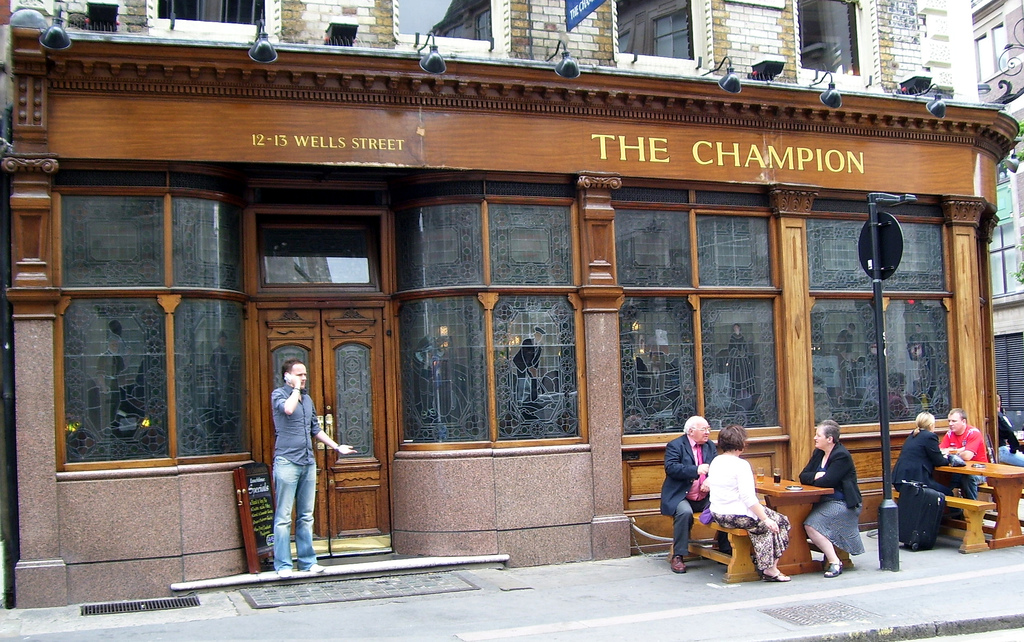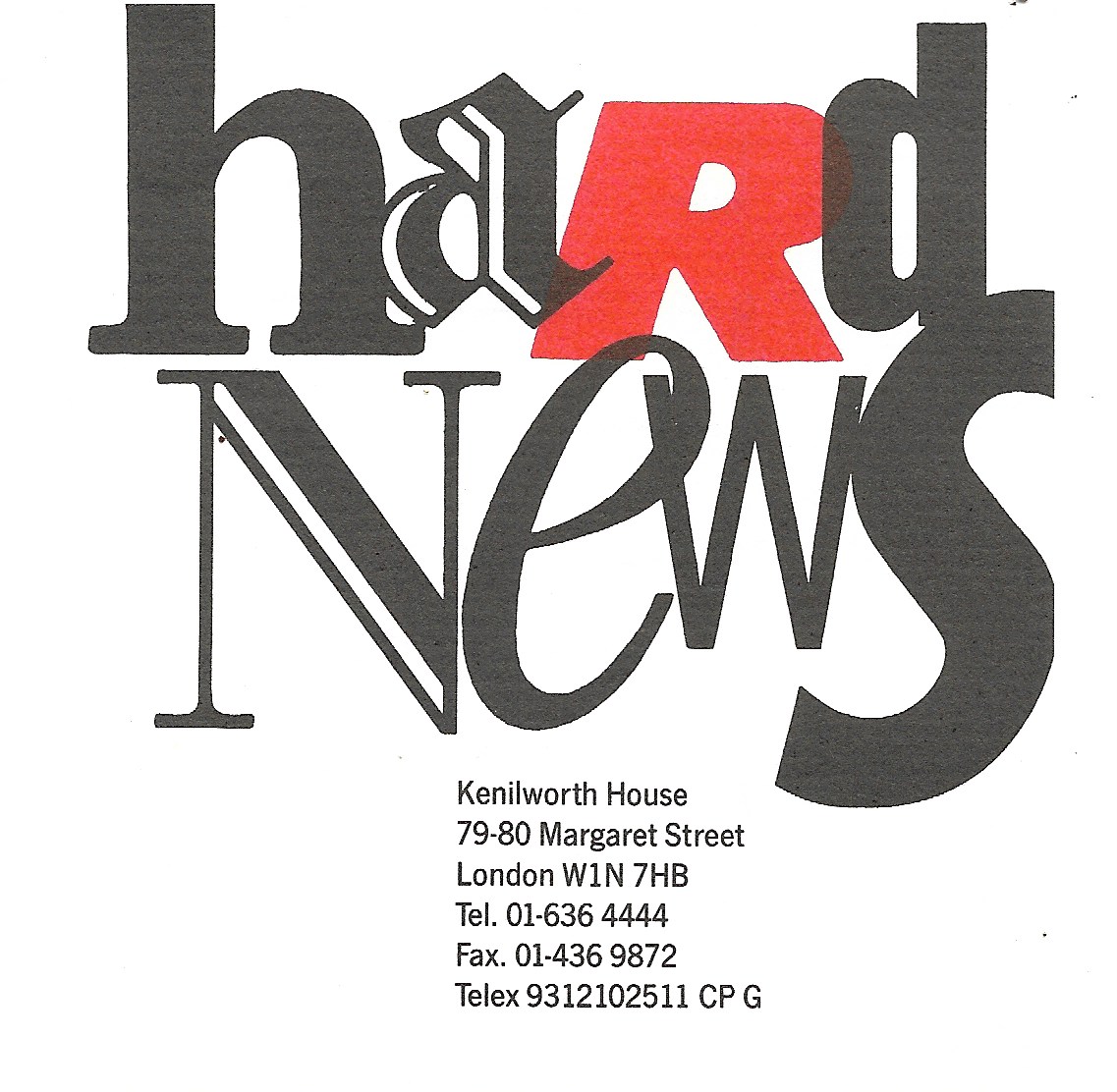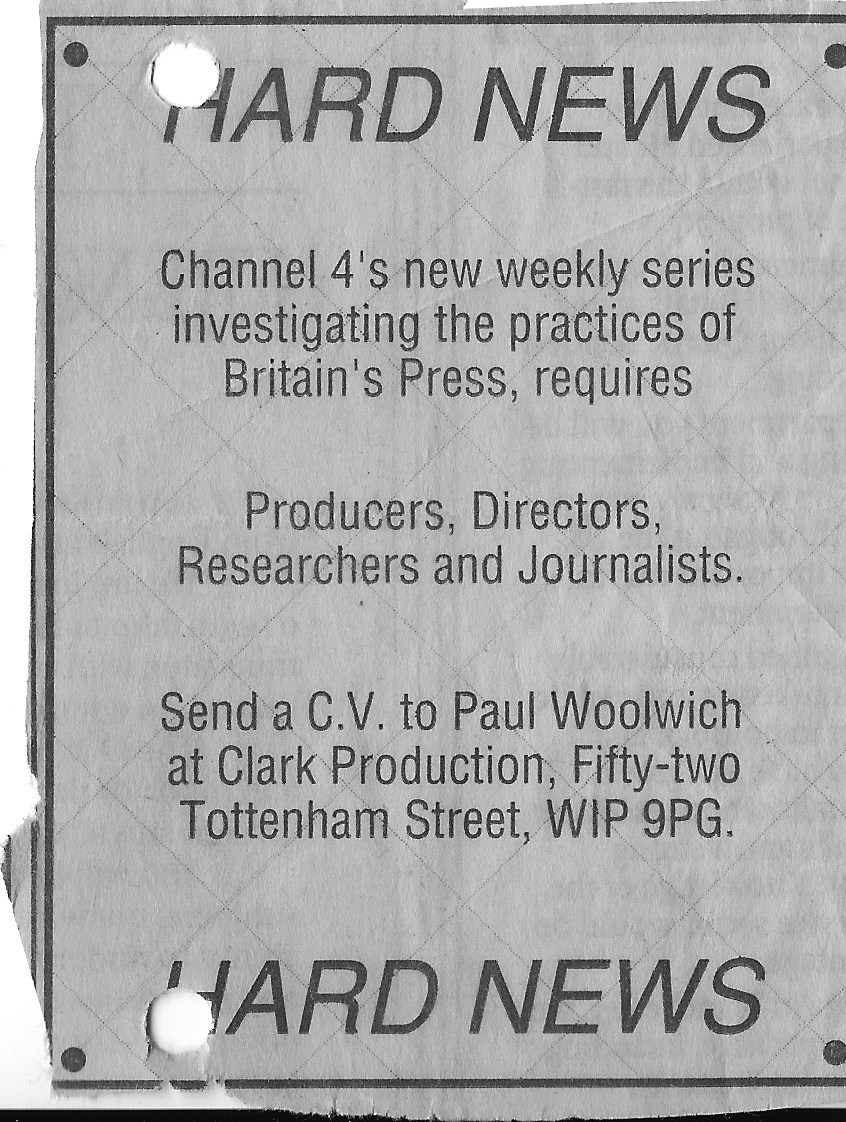I wrote this piece in 2018, as I prepared to leave the BBC. I’d spent 29 years working there, but my career had actually begun with a short lived stint on a Channel 4 series. This is how it happened…

I’m standing opposite The Champion, a pub just off Margaret Street in the heart of London’s media land. It’s a handsome old building; ornate stained glass windows, pale brick walls and plenty of varnished wood: a classic London pub.
I glance across at a spot on the pavement outside the pub, and I see myself standing there 30 years ago, with a group of my new colleagues. It is spring in 1989 and my career in television is just beginning. Holding court is my boss, Paul Woolwich. A rising star in the industry, he has just resigned from the BBC to take up a job editing a new Channel 4 programme called “Hard News”. Its subject matter will be the failings of the UK press – each programme will go behind the newspaper headlines and discover the stories behind the stories. Around us are a bunch of ambitious, talented young television producers and researchers, most of them also recently departed from the BBC.
Warm evening sunshine has found a way through the gaps in the surrounding buildings, and I am dazzled in more ways than one by my new career. Optimism and excitement are in the air. Paul entertains me by emphasising how the BBC’s hold on you extends even after you leave its employment. He recites his BBC staff number, and in quick succession gets all the other ex BBC staffers to quote their own. They all know their (old) staff numbers off by heart. Amongst my new colleagues are Kevin Sutcliffe, who will go on to edit Dispatches and become a senior Executive at Channel 4 and Joe Bullman, who will become an award winning documentary maker.
The scene dissolves and I’m back in the present. It’s a cloudy, cool, autumnal day. Thirty years on the pub hasn’t changed much, but I have. For one thing, I am now nearing the end of my career in television. It’s a career that was never planned. I never thought I would be a journalist, a producer of Science films, a BBC lifer. I’ve been to amazing places, worked with people far more talented than me, learnt a lot, and had a great deal of fun. I’ve also made some programmes of which I am very proud, and even won some awards. When I was about to join Horizon at the end of the 1990’s, John Lynch – the then head of the Science department – said to me: “Come and work here and you’ll have some great stories to tell your grandchildren”. It may be a bit early for Grandchildren, but the sentiment was right on the money.
My career has been deep and narrow. Apart from a short period on Hard News, I’ve spent my entire working life at the BBC. I’ve worked in just two areas of programme making; Current Affairs and Science. On at least three significant occasions I nearly lost my job in failure and disgrace. But now I’m leaving on my own terms, with other things I want to do with my life.
I often get asked, how did you get into television? How did you end up making science documentaries? The route I took is no longer available and nothing remotely like it now exists. Still, just for the record, here’s how it all began…

In March 1989 I was finishing my Geography PhD (an analysis of political change in the Durham Miner’s Union, leading up to the 1984/5 strike) at Durham University. My thoughts turned to “what next?”. I contemplated an academic career, but without enthusiasm. Then I saw an advertisement in the Guardian for a job on a new Channel 4 programme called “Hard News”.

Amongst their requirements were “researchers”. It sounded intriguing. After all, what was I, if not a researcher? I fired off an application. A few weeks later I was invited down to London for an interview.
The scene of my subsequent evisceration was a basement in Margaret Street, surrounded by chaotic piles of boxes of unpacked office ware. Upstairs, the production office was taking shape. Downstairs I was grilled by the programme editor Paul Woolwich and the company boss, Bernard Clark. They destroyed me. What newspapers did I read? Well, the Guardian, obviously… What about tabloids – the main subject of the programme? Er.. no. Any experience of student journalism? No. Any relevant experience at all? None that came to mind. In short, I was comically ill prepared. Nevertheless, a week later they offered me a job. I think Paul liked the idea of having someone with a PhD in the office. I guess I must have also expressed a certain passion for the task at hand. Since I was going to be paid next to nothing, it probably wasn’t that big a risk.
Looking back I marvel that I made it through my first 6 months. I still have in my possession one of the “ideas” I came up with for Hard News – a piece about the under-reporting of a Korean shipyard strike. There was much more of that ilk. Armed with the certainties of youth, I spent my time in programme meetings sniping at Paul’s editorship, whilst pushing my Spartist agenda (inherited from my PhD) and grumbling about the unadventurous (ie popular) stories we were picking.
Despite my callowness, Paul took a brave leap. Rather than telling me what a jerk I was and shipping me back off to University, he upped the ante. After a few weeks he told me that I – a trainee researcher – was going to do his job. I would edit the next programme. I’d choose the stories, sort the running order and help write the studio intro’s. It was a brilliant piece of man management. I now had to take responsibility for my posturing, instead of sitting on the sidelines telling him how to do his job.
Predictably enough, I came unstuck in epic fashion. I championed a story that was getting more and more wobbly with every passing hour. I knew it was falling down, but I stuck with it, paralysed by the fear of what would happen if the story was abandoned so late in the day. Finally the story collapsed. I went to see Paul to tell him, and broke down with the shame and humiliation. Paul had made his point. Deftly he took charge. He’d spotted long ago that the story was in trouble and behind the scenes he’d put in place a contingency plan. I think all that saved my career at that point was my tears: at least I cared.
Not that I showed any gratitude. I continued to whinge from the sidelines and left Paul so bitter that when it came to my leaving do, he put in only a perfunctory appearance and left early. Only then did I dimly realise how much I’d hurt him.
I flirted with going back to academia. A job interview for a scholarship at Oxford University had apparently seen me “come second” in the competition for a single place. Had I been offered the job I’m sure I would have taken it, and my time in television would have been nothing more than a minor footnote in my life. Instead, still hunting for something to do, I applied for a researcher job at Newsnight. There were three places on offer, and (I was told later) upwards of 700 applicants. Bizarrely, I got one of the jobs. Much later I learnt that I was very definitely the third choice and only got the job because Paul Woolwich (who had been deputy editor of Newsnight in his time at the BBC) had given me a glowing reference.
Unexpected and undeserved it may have been, but at least once I arrive on Newsnight I had the gumption to realise I’d been gifted an extraordinary opportunity. It helped that Newsnight at the very end of the 1980’s was one of the most exciting places to be in television. The Berlin Wall had just fallen. Margaret Thatcher was on her last legs. The poll tax was convulsing Britain. In the pre internet era of what is now referred to as linear television (but was then just television), Newsnight was at the centre of these great stories. I was surrounded by hugely talented colleagues, many of whom would go on to great things. My career was at last up and running. I didn’t pause to look back.


Looking forward to the next instalment!
LikeLike
Hey Jon, my name is Alan Wiseman, I had the urge to find out how some of my contemporaries had fared as I too come to the end of my career and found your website and blog. I have been designing electronics equipment since 1985 and have done sonar systems for trafalgar class subs, dunking sonars for sea kings etc and like you thoroughly enjoyed myself along the way. I now have two sons, Luke (14) and Ryan (10) and I look back fondly on our physics lessons and other parts of my child hood as the boys go through school. I still follow F1! Hope you and the family are well in these strange times. Alan
LikeLike